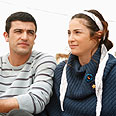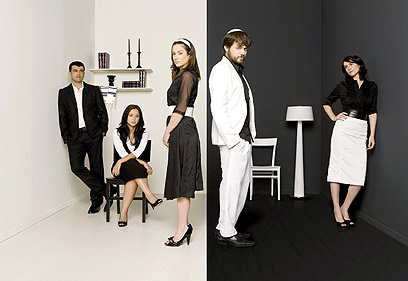
Sex and the holy city
Jerusalem turning into pick-up stronghold of national religious sector: Kosher bars, active synagogues, mass Shabbat meals, as well as direct contact and sex. Laizy Shapira, a 32-year-old religious bachelor, speaks of changing rules featured in his new TV series
"Jerusalem for the religious is like Tel Aviv for the seculars," he explained. "A religious person over the age of 20 who has yet to marry will find himself there. Shavuot, for example, is one of the greatest bachelorhood holidays, when everyone goes on a pilgrimage to Jerusalem, to the synagogues and our entertainment centers.
"In Jerusalem, by the way, you can find a larger number of girls wearing pants, you will find much more pluralism. It's really different from the image you have of it. It's just like Tel Aviv, with coffee shops, kosher bars and synagogues which are the center of our scene.
"On Fridays you can see large gatherings of people outside the fashionable synagogues, talking and flirting with each other, and a lot of sparkles in the air."
And what's wrong with Tel Aviv?
"In Tel Aviv it's much more difficult. Jerusalem is a lot of fun for us. We have our cultural institutions which are sufficient from a cultural point of view, we have our kosher pubs and all options exist. I lived in Tel Aviv for a short while, and when I wanted to go out at night, it wasn't a simple thing finding places. Finding a non-kosher place in Jerusalem is a challenge, and therefore it's very convenient."
Shapira experienced life in Tel Aviv while filming his new TV series "Srugim" ("Knitted"), originally titled "Sex and the Holy City." Despite the more pious name, the intentions are still clear: There is a thriving love life in the religious sector, rules are changing as we speak, and this can be turned into a primetime series.
"I had a small crush on Tel Aviv during the filming, but I don’t think I would move there, because this series would not exist if I hadn't lived in Jerusalem, and I'm having a lot of fun there. I even have a parking place.
"I was at the Whiskey A-Gogo bar in Tel Aviv with the actors, and people got drunk and I felt really strange there with the skullcap on my head. You have a slight feeling of blasphemy when you go so these places, even though you are not really doing something bad."
Clock ticking
Even after giving up on the original title, "Sex and the Holy City," Shapira – a graduate of the Ma'ale School of Television, Film and the Arts – admits that sex could not be avoided in a TV series dealing with religious people's sentimental life, simply because it happens.
"I couldn’t ignore the sex issue in the series because I would be ignoring reality. It exists, and I was really scared by these scenes, causing anxieties among the actors as well. The scenes I was most afraid of were those which included innuendos of sex and contact, because in the Israeli series and films the sex is extremely brutal and I wanted to do something else.
"At a certain stage there is a scene which we know will end with sex, and it was eventually gentle and charming. There is something pretty special in the fact that you can see such things in a series on religious people."
Well, we already saw flirtations on 'A Touch Away'.
"My series is the most reliable religious thing I've seen on the screen. Every time religious people are presented on the screen, the skullcap is in the wrong angle or the text doesn’t make sense. I was strict with every single detail. Even the skullcaps were knitted by my niece."
He may deny it, but Shapira created the series mainly for himself, and perhaps in order to meet new girls. The majority of the "Srugim" plot is derived directly from his daily life as a 32-year-old bachelor who has gone on dozens of dates but has yet to find the one.

'Srugim' (Photo: Ido Lavi)
This may sound like a plot for another of the dating series sweeping the screen, but in Shapira's world this is a real crisis rather than romantic caprices.
"I have gone on many dates over the past decade," he says, "and after turning 30 my parents lost hope. They show a lot of support for what is happening to me now, but manage not to mention the wedding issue. They know I'm working on it."
Working on it in Jerusalem?
"What can I do? In the small communities, if you have no family and children you have nothing to do (in Tel Aviv), and everyone starts wandering to Jerusalem, turning it into the center. Somewhere you create an alternative family with your roommates and new friends, and the new Shabbat meals become something special. The girls bring pies and food, the boys bring drinks and hummus, and one can see the streets of Jerusalem filled with people walking with plastic bags on Shabbat. They call it 'the plastic bag march.'
"I haven’t done this for years. I will always try and bring what I prepare on Friday with the car. There is something very humiliating in walking with a plastic bag on the street. There are intimate meals of four or five guys and there are meals of 15 people where you don’t know anyone. Sometimes I find myself walking 40 minutes to a Shabbat meal. It's nice. The greatest fun is walking on Friday night."
What are the common pick-up lines?
"Where are you praying this Saturday? I'm kidding, there are no pick-up lines. Every line works."
And how do you make a move on girls?
"The best way to make a move on girls is during a Shabbat meal. You come to the hostess, ask for details about the girl, she tells you about her and gives you a phone number, and you take it from there. Today there are even people who feel very open and make a direct move on the girl, even at the synagogue.
"I don’t really have the courage for these things, but I've still done it several times. You usually get to know girls through common friends, although I don’t like accepting offers from people who simply know I am single. But today I am really more open to suggestions."
Is the clock ticking?
"Yes, that's exactly how it is."
15 years late
After a short term in the central city of Rehovot, Shapira's family moved to the settlement of Karnei Shomron, where he lived from the age of 13 till he joined the army.
"After graduating from the yeshiva at 23 and starting to go out with girls, I had a date with someone and it really annoyed me that she wore pants. She arrived with trousers to the first date and I was really embarrassed. I walked around with her and kept looking sideways, because I felt people were staring at me.
"Now the situation is the complete opposite: I view girls who don’t wear trousers as strange. What I view as important is modesty, not what she wears. I grew up in a home which was highly conservative as well as liberal. My sisters, for example, will never wear pants, and they are married and wear a head cover. On the other hand, however, we always watched films at home, and the classics we watched at school I had already seen at home."
Shapira was admitted to the film school after realizing he wishes to engage in arts. "It's a new development among the religious. We're always 15 years behind the seculars. Just like the trips to the East have become popular among us and the army is popular. We always arrive in a small delay."
How is the delay created?
"We are very influenced by the seculars. The national religious are always half here and half there. We suddenly want to see the world before we get married. We want to accumulate experiences, travel, study, and then when it's too late we remember we also want to settle down.
"In some place, when you reach this age, because you have already passed the young age, you start nurturing yourself, go to ceramic classes, and you turn into a very definite person, making it difficult to define yourself with someone else.
"I see my sister, who married very young, and she and her husband grew up together and don’t regret it for a second. On the other hand, when I see my friends from the reserve duty with five or six children, it goes to my heart because this is a place I am already supposed to be in."
As a religious man on a date, do you still keep your distance?
"I don’t want to talk about what I do or don’t do. With us everything is much more dissolvable in terms of keeping a distance. It also looks very ridiculous – even though this is Jewish law. People are beginning to cut corners. Many more people are saying out loud that they cannot go out with a girl and not touch her. I'm not talking about sex, although there are those who go there as well. Several years ago I would say this is absolutely impossible, but things change."
Would you date a secular girl?
"No, because I want a very specific home. In our society, when you go out it's for one goal – to get married and start a family. It is clear you want to find a life companion, etc, but it's not like you're going to be together for two years and then separate."
Nonetheless, you must have still had the urge to cross the line into the secular world during the filming.
"I wouldn’t want to be in the secular world. It doesn’t attract me. There are clearly nice things, but I eventually felt terrible near the secular actors. They live on the edge. Although they seemingly do everything like us, they eventually do much more than us, they live more. I don’t know if they're happier, but they live more.
"I am older than all the actors of the series, but I felt like their child. They have taken everything, tried everything, slept with everyone. That's what I felt. We the religious are getting spoiled, were becoming more like you in a way, but it's still something very naïve because we are like you when you were 16."
In what other ways is the change expressed?
"Ten years ago, divorce was a taboo among the religious. But suddenly I see friends of mine getting married and divorcing several years later. It has become legitimate. And I also hear more and more about infidelity. It's obviously not as common as in the secular world, but I hear stories from communities and small places.
"I remember hearing my sisters talk about adultery, saying they have six children and are exhausted, and they asked how could people find the time to cheat. So no worries, everyone has time. There is also more openness regarding homosexuals. These things no longer remain in the closet. They come out."
Are there pick-up bars?
"I don’t think so. I don’t think it is possible for a religious person to enter a bar alone and leave with a girl he met there."
So what are there?
"Pick-up synagogues."










